In Ukraine, a group of young men escape the trauma of war with good old American football.
On a turf pitch ringed by rainbow-colored poles and Soviet-style apartments, a man with ice blue eyes lines up, hand-painted helmet on his head. The quarterback hikes, and Dmitry Vukich runs, catches a pass, snaps it to the ground, and keeps running. Dima Sivenko, a 16-year-old who lied about his age and weight to join the team last year, sprints forward, drops a pass, and returns to the line. Maksim Karmazin lines up and his phone rings.
An Azov Dolphins practice is indistinguishable from any football practice in America—goofing off in the locker room, warmups and stretches, drills, sprints, scrimmaging—until the running back steps out mid-drill to sell meat to local stores over the phone.
In the port city of Mariupol, Ukraine, people are finally peeling the tape X’s—the ones that keep glass from shattering under shock waves—from their windows. You almost can’t tell that the front line of a military conflict is only seven miles away. Normalcy has fought its way back into the most polluted city in Ukraine, where children’s futures are determined by one choice: the factories or the port.
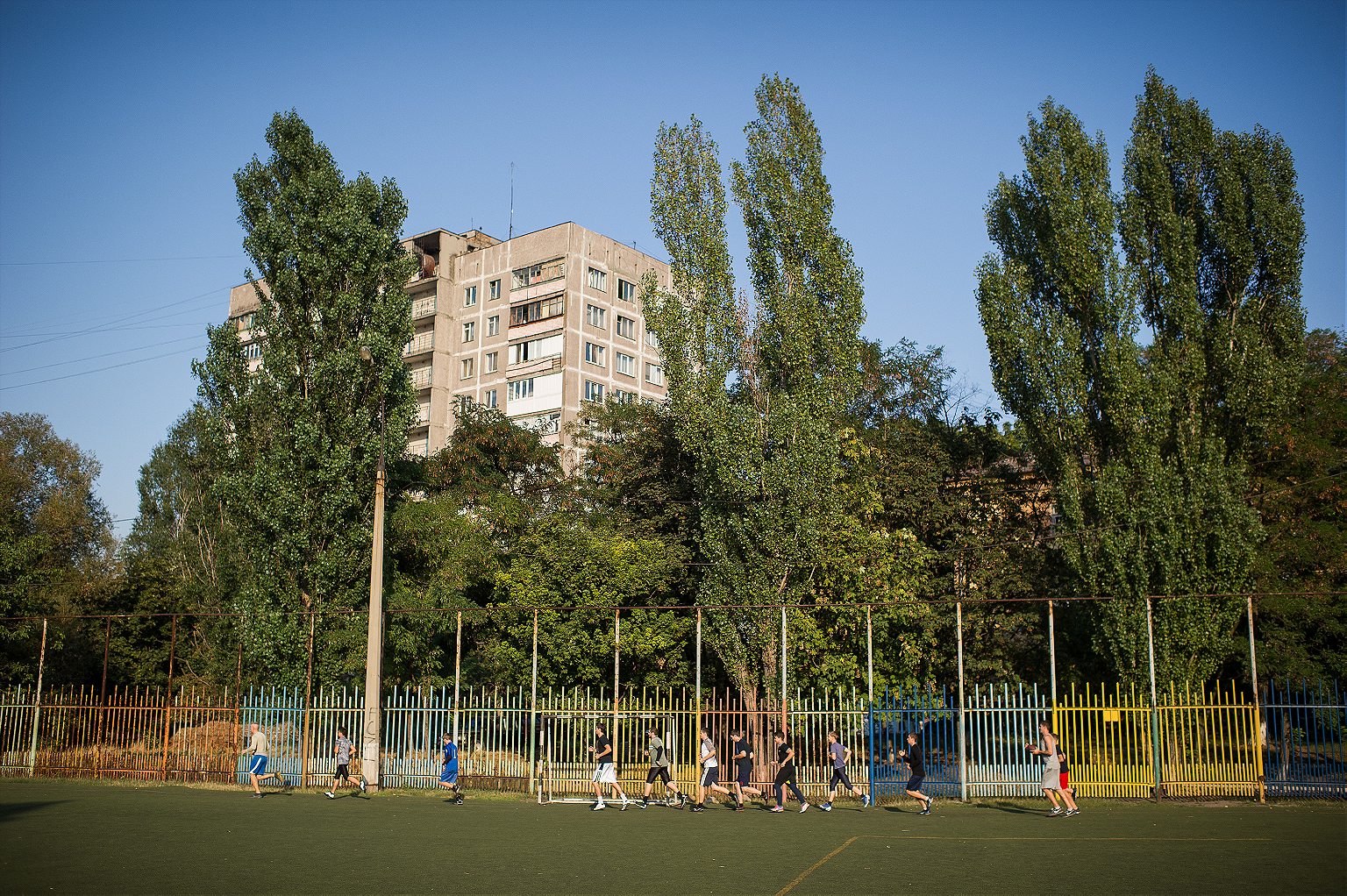
The Dolphins are an anomaly for many reasons. Formed in 2012 by a group of friends in a bleak neighborhood called the Pentagon, they lost both of their coaches to the war diaspora—one to Kiev, one to rebel-controlled Donetsk. Some of its players are active soldiers on the front line, some are high school students, some have had to flee the war. Dmitry, only 21 but with an imperial charisma, captains the team along with Andrey Kulivets, the defensive captain. They watch YouTube videos of football drills and do their best to mime them.
Not long ago, Mariupol was the site of revolution, of shelling and gunfire and blood and fire. It briefly fell to rebels in 2014 before its recapture by the Ukrainian military. In 2015, it was heavily shelled. The closest city to the rebel-held Donetsk People’s Republic, it has seen thousands of its citizens displaced, and has taken in thousands of citizens displaced from the DPR.
The Dolphins play in the Ukrainian League of American Football, but two of their last three seasons were cut short by the war. A single away game costs each player $40, or one-third of the average monthly salary in Mariupol.
Mariupol is an ecological disaster. To play American football here—to be any kind of athlete—is to defy the dangerous levels of benzapiren, formaldehyde, and ammonia that seep from the factory smokestacks. It’s also, according to the league’s director, “three hours of American way of life.”
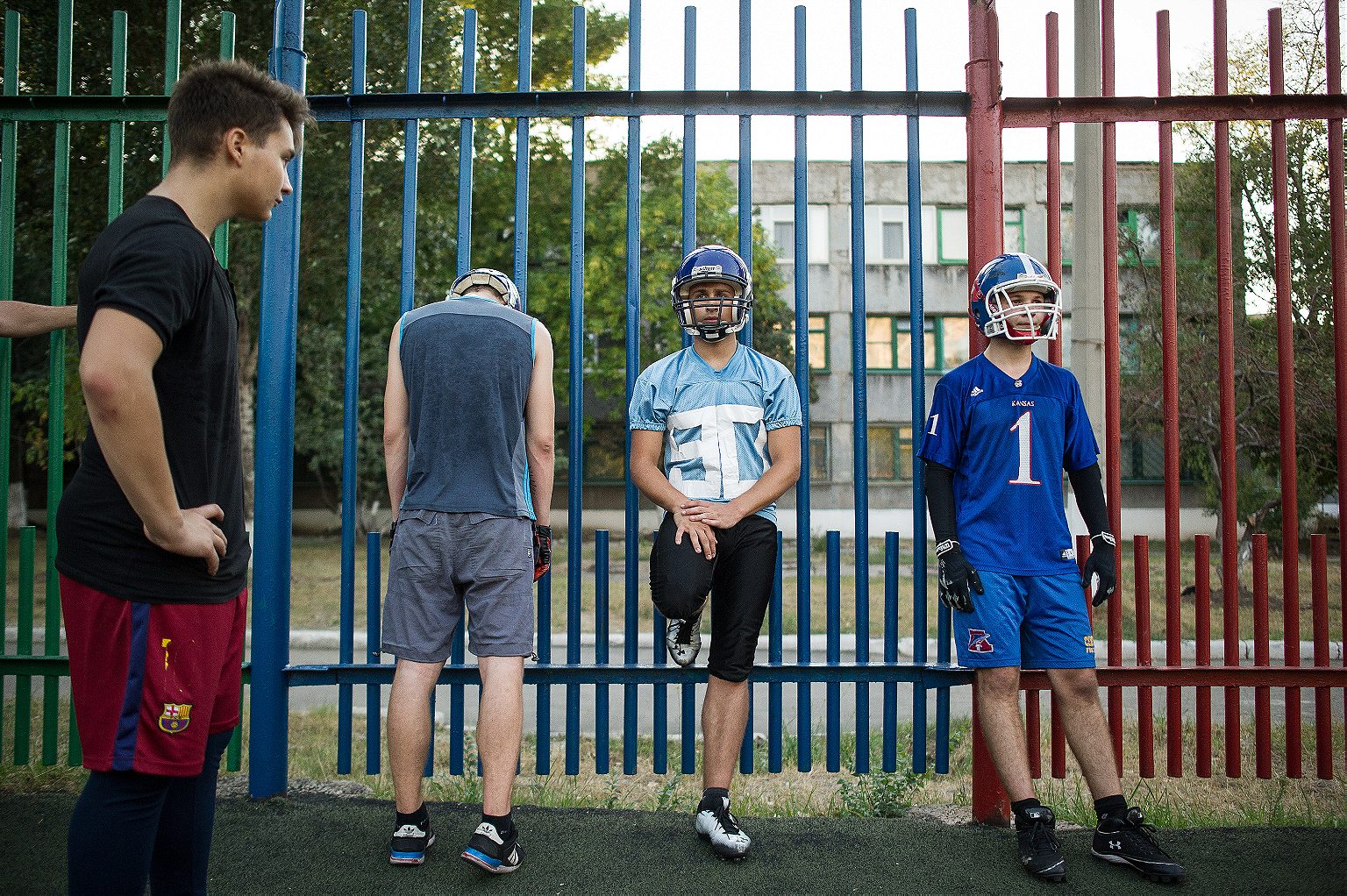
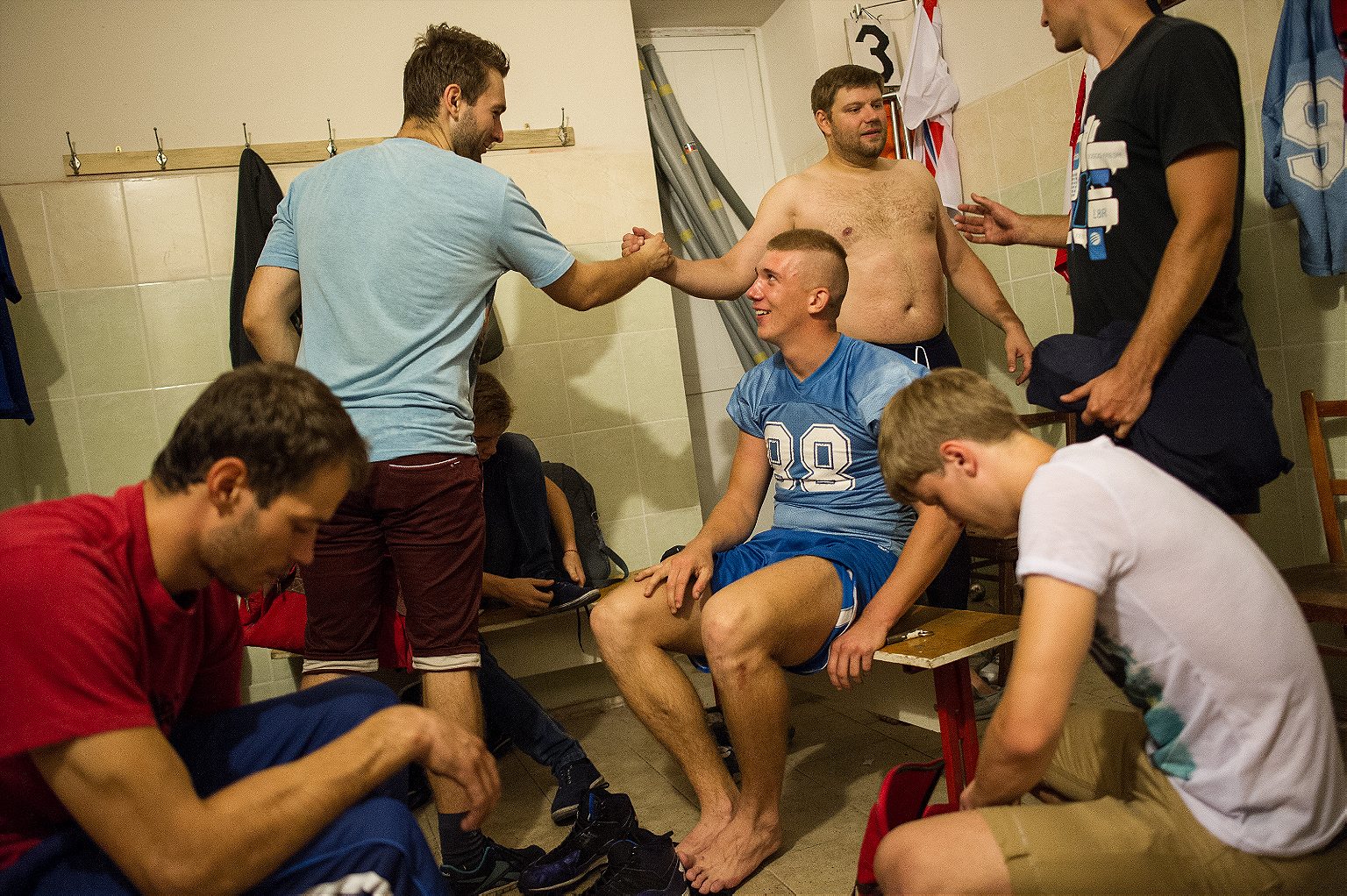
The tradition after practice is to walk a mile to the shawarma stand on Metalurhiv Avenue. By the time the players arrive, it’s dark. Orange light beams from the stand.
Although the Dolphins just lost the last game of their season 26-12, they’re confident that their fans are starting to understand the rules.
In the first year, the core of the team—Dmitry, Andrey, and a few others—had to guess at the rules themselves. “It was very harsh,” the team’s quarterback says. “It was all blood. We didn’t know how to play, so we would just kill each other.”
“A lot of people ask, ‘Why are the games free?’” Andrey says.
“We’re trying to do something to distract from the war,” Dmitry finishes.
Andrey and a few others start trying to pinch one another’s nipples and everyone laughs. Dmitry smiles, encased in the orange shawarma light.
What is beginning in the U.S. has been ongoing for years in Ukraine
Dima, the 16-year-old, lives in a four-room house in a neighborhood of corrugated fences and roofs, grape vines and rose bushes. There, he spends his time watching NFL games translated to Russian on the social network VKontakte.
Dima doesn’t act like a normal 16-year-old. He’s quiet, even with friends. His hair is neat, his hands folded when he talks. His body language is square and symmetrical. He rarely smiles, unless you do. On the cusp of adulthood, his life has become one of constant consternation.
“This is not our war,” he says. “Brother fighting against brother is not war.”
Dima’s closest friends were forced to flee town. One was identified on TV as a separatist and had to escape to Crimea. The friend urged Dima to follow, but he refused. “I’ll go anywhere, but not to Russia,” Dima told him. “Better to go to America.”
“I really like history,” he says. “I found a source that says the U.S. owes Russia $12 trillion. So Americans started this war in Ukraine against Russia, so that the documents proving this will be burned. It says the Americans want to start a third world war to find these documents and burn them.”
Being in the epicenter of a reality-bending information war between Ukraine and Russia, Dima, like most in Mariupol, has no idea what to believe. Half the time, people don’t even know who the combatants are. Some think the shelling from the rebels was actually the Russians, some the Americans. Some believe the Ukrainian army shelled itself in order to blame the rebels.
What is beginning in the U.S. has been ongoing for years in Ukraine. Disinformation has split a country into brutal civil strife.
American football, though, is an escape. Dima likes the Miami Dolphins, though he can’t name the players. “They create miracles on the field,” he says. The only place he knows he wants to go besides Kiev is Miami, Florida. He wonders if football can someday take him there.
“When I play American football, I feel like I’m in America,” he says. “When I’m in practice, I imagine playing in the NFL on one of the great teams in one of the great stadiums with lights shining on me and people applauding me. I’m jumping to catch the ball. It’s a great moment.”
Dima mentions that dolphins, by nature, aren’t supposed to be in the Sea of Azov. They aren’t well-suited to the pollution and the increasingly shallow depth, so when they slip through the Kerch Strait and find themselves in the Azov, they often get rescued and thrown back into the Black Sea.
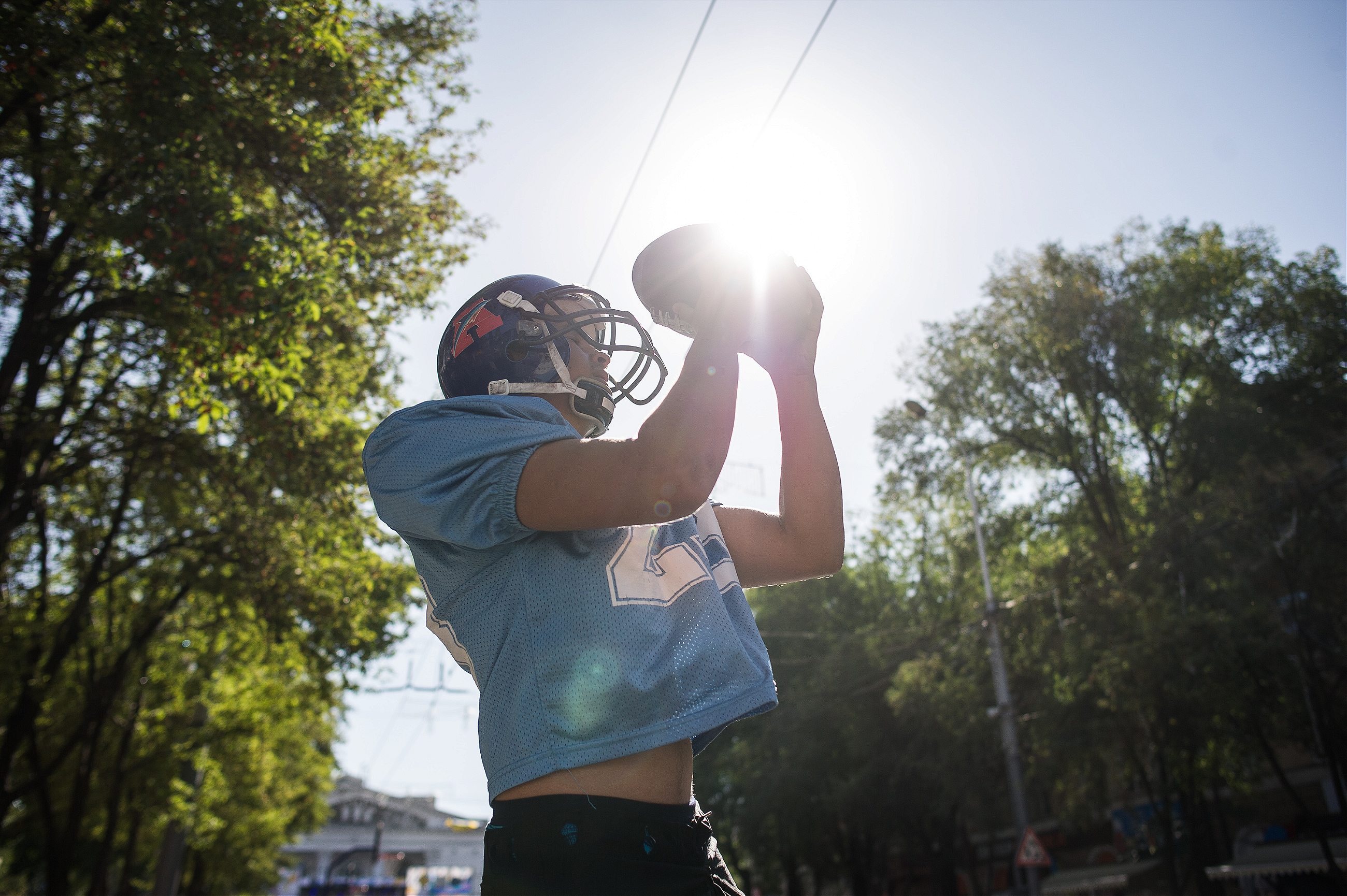
It’s a warm night, and Dmitry has called a team meeting at a local café to plan a weekend event. As it breaks up, some of the core Dolphins lag behind.
Maksim the running back, Maksym the guard, and Dmitry hop into a car and peel out of the dark parking lot. Maksym stops at an intersection to let a massive tractor-trailer carrying a BMP tank pass, its lights flashing.
Away from the factories, Mariupol is quiet at night. They drive to a guard shack at a logistics plant at the end of a long, empty black road. Dmitry steps out. Andrey, a bull-faced defensive captain sporting a buzz cut, comes out of the guard shack. They stand under a lightbulb outside the shack, the only light for hundreds of yards.
It’s a beautiful night but for the mosquitos. A bat flies in the dark across the crescent moon. Dmitry points at it. “They fly towards the light,” Andrey says. They watch the bat for a moment. This is where a decent Ukrainian would light a cigarette, but they don’t. They stand awkwardly for a few moments together. Then they switch. Dmitry clocks in in the guard shack, and Andrey gets in the car. They drive off.
Oleg and Valera are waiting for them at the pool hall. This is the core of the team. They order a round of shots and play a version of Russian billiards called “The American.”
Valera spent most of his life dreaming of working at the chocolate factory where his mother worked, but it closed in 2012. He had to quit his job at the Ilyich steel factory because of his asthma. Maybe he’ll learn English. Move to Norway.
Oleg still works at Ilyich, making about $80 a month. “Everything there is very Soviet. Nothing changes.”
When Mariupol began to be shelled in 2015, Oleg escaped to Vinnytsia in central Ukraine for three weeks. When he returned, the shelling was still going, but he saw people walking around like normal. “I only then realized that people could get used to anything.
“One evening, I came back from work, tired, and I started watching an action movie,” he says. “So there were lots of explosions. Eventually I started realizing the sounds of the movie were mixing with real sounds outside. At first I was thinking, ‘Wow, the sound in this movie is incredible.’”
“I don’t really care what’s going on around me, as long as it doesn’t affect me,” says Maksim, playing pool.
“That’s the problem,” Valera says. “Too many people in Donbas think that way.”
For Dima, loving Ukraine means hating Russia
In the eastern province called the Donbas, the Ukrainian history books are in Russian. No one speaks Ukrainian on this side of Ukraine. That’s a big part of the identity confusion here. For Dima’s parents, loving Ukraine meant loving Russia. For Dima, loving Ukraine means hating Russia.
Laskavo prosimo! proclaims the blue and yellow exterior of School 65, Dima’s school. Welcome, in Ukrainian, in the national colors. Everything on the inside is in Russian.
In Dima’s history classroom, there are at least four iterations of the Ukrainian flag on the walls and the Ukrainian constitution sits on a bookshelf. Dima, in a neat blue and yellow shirt, takes notes in a blue and yellow notebook with a blue and yellow pen.
Dima’s teacher asks her students, in Russian, to name the four countries that occupied modern Ukraine at the start of World War II. Poland, Hungary, Romania.
“And what is the fourth country, the biggest in the world?”
“Russia,” someone responds.
“No, back then it was the USSR.” She tells them to look at a map on the wall.
“Show me a superpower after World War II. It’s still a superpower.”
“Russia,” a boy blurts out.
She shakes her head. “You’ve made a great compliment to Russia,” she responds. “It’s the U.S.”
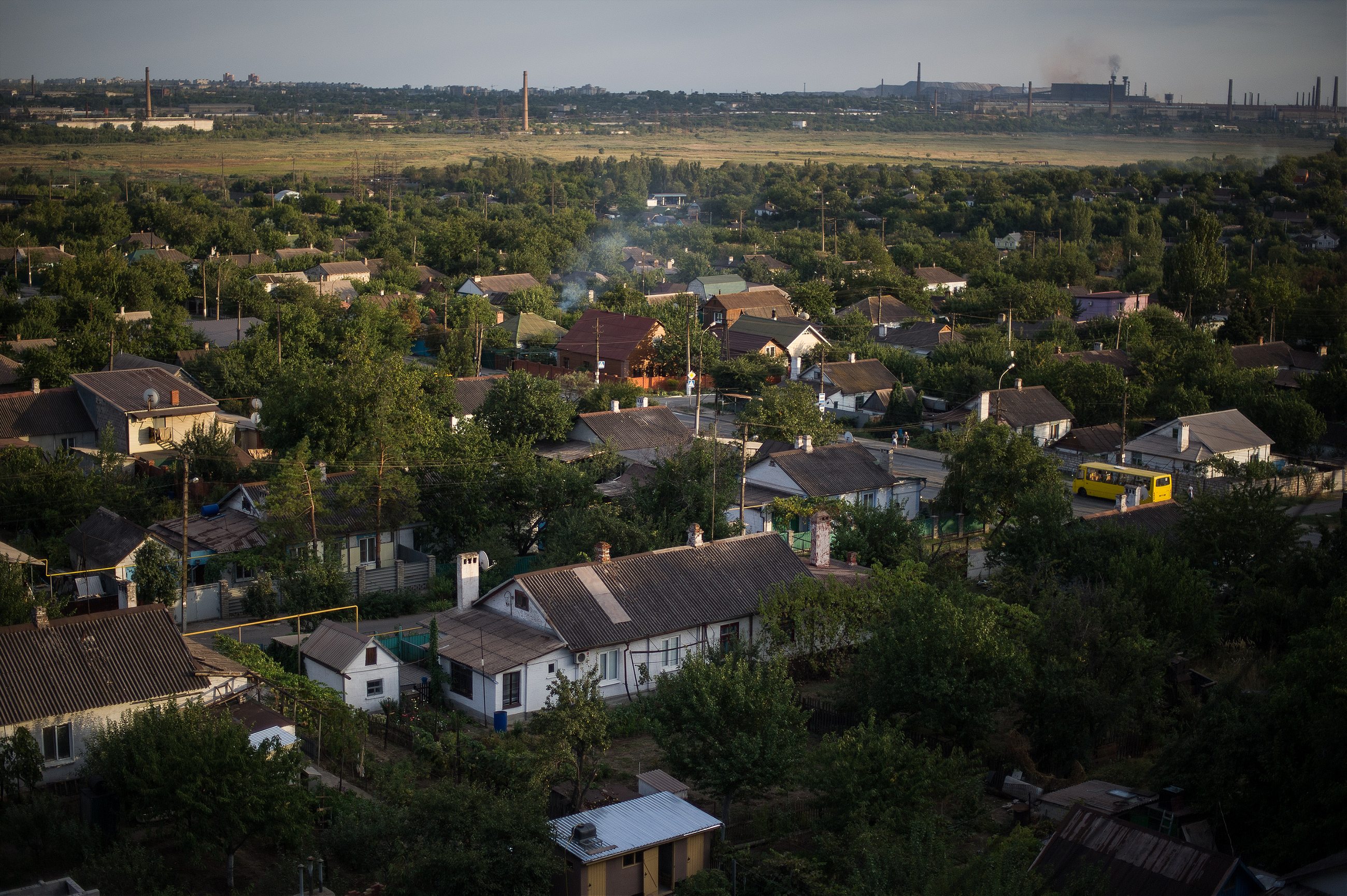
At the grocery store, Dmitry leads his girlfriend, Katya, down the aisle, trailed by Andrey and Oleg. He buys clear plastic cups, green tea, bread, dish soap, mayo, hard candies, a gallon of water, sugar, and two cans of light beer. It’s a special occasion.
Dmitry, at 21, is moving into his first apartment tonight with Katya. Yesterday, Andrey and Oleg had heaved his furniture nine stories up the bloc-style complex in the Pentagon. The flat’s concrete walls, which once belonged to Dmitry’s grandmother, are covered in peeled scraps of yellow-white wallpaper. The only décor so far is a wardrobe, a green velvet couch, a couple of chairs, and a green coffee table around which they all sit. Dmitry puts out a cup of beer nuts and pours the two beers into four plastic cups to share.
The window across the room looks out to the Voztoychnya district, which was heavily shelled. You can see the rebel-held territory among the windmills to the northeast. Dmitry used to watch missiles fall like rain from the roof of the gas station where he once worked.
“Let’s drink for the babayka not to be present here,” Andrey says.
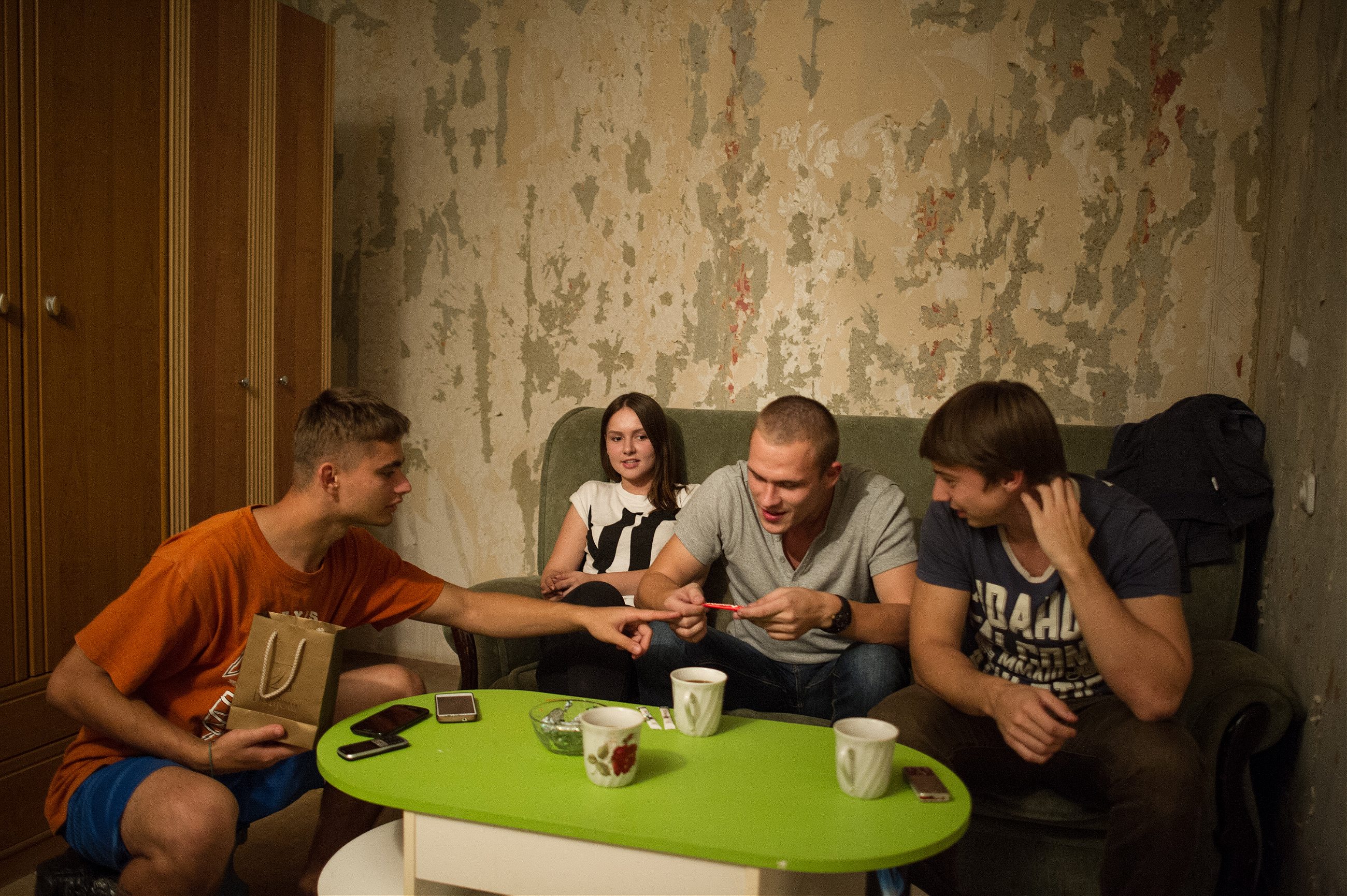
In the living room, the Dolphins try to list the films and shows that inspired them. Remember the Titans. Rudy. The Longest Yard. Blue Mountain State. Friday Night Lights. Concussion.
Dmitry gets up to bring coffee and tea. He comes back with a gift bag, sits down, and stops the room. He holds it out to me. “Take one,” he says. I reach in and pull out a sugar packet.
“Yuzhne,” he says. He shakes the bag. “Another.” The bag is full of sugar packets. I pull another out, and the room fills with cheers. It’s a blue packet, from Oleg’s legendary vacation to Dubai. I realize these packets are collected from all the places the team has been on away games, and they’ve memorized each sugar packet.
Another. “Oooh”—Kiev. Another. A disappointed “aww”—Mariupol. Another. Kiev. Dubai. Pavlograd. Mykolaiv. L’vov. Vinnytsia. Kharkov. Yuzhne.
It’s a neo-imperialist’s wet dream
Dmitry has prepared a booth on Prospekt Lenina, one of Mariupol’s main streets, for the Day of the City, a celebration of local athletics. It’s the first major community event since the war started. Amid flower vendors, rowing and boating clubs, sausage stands and bakers-on-wheels, taekwondo and floor routines, ping-pong tables, basketball hoops, and soccer goals, he has planted the flag with the Azov Dolphins logo on it, ripped from the AFL’s logo online. Crowds of people mill through the upbeat morning festival.
The Dolphins are recruiting. They need players, a coach, and community support. Their league is applying for a sponsorship from the U.S. Embassy to hire a coach—any coach—from abroad, which they’re desperate for, but they have no idea how or where to find one. Dmitry worked night on a guard shift, so he hasn’t slept much. He’s laid out a tablecloth, two American footballs, a jersey, and medals from two different tournaments arranged to look like seven medals. A handful of Dolphins players arrive in full pads and uniform. Dmitry huddles them up and assigns roles. The players form a circle and start throwing the ball around.
Two 10-year-olds in taekwondo doboks walk by.
“Look how well that ball flies.”
“I know.”
“Look at their shoulders. Do you think they’re fake?”
“No, they just work out.”
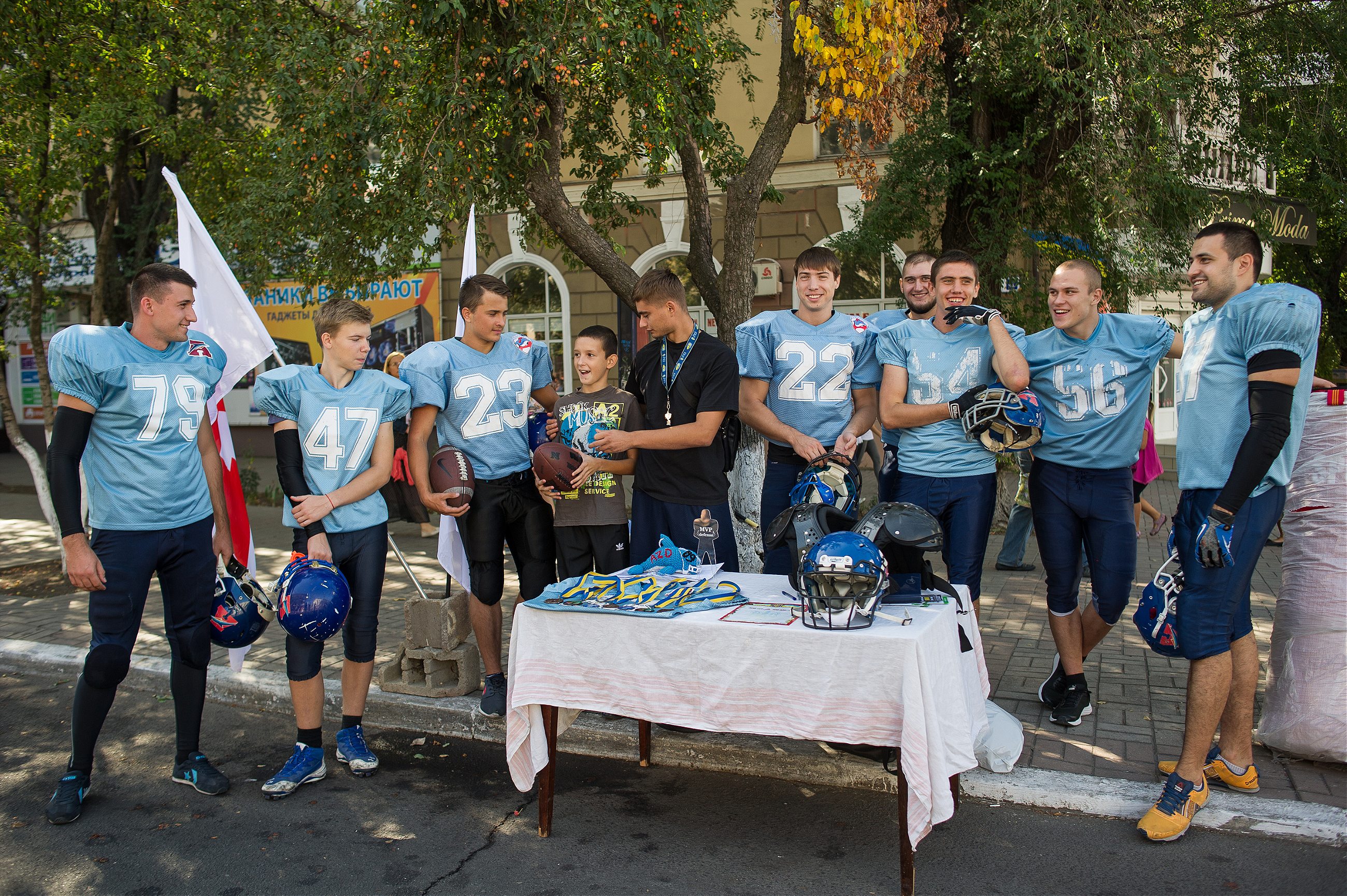
It’s a neo-imperialist’s wet dream. Mothers with strollers stop and stare. Men take pictures. The Dolphins in pads start slamming into each other, one by one. The handball players stop playing to gape.
Dmitry, with the air of an entrepreneur, hands out printed sheets of paper to anyone that will take them. “These are the rules to our game.” He says our. Not the. It implies the sense of bandaged identity underlining the jokes, the swear jars, the nipple twists, and the cathartic joy of slamming pads against pads.
“We need people to try on the helmet and pads,” Dmitry says. “Go over there and ask if they want to feel American football.” He snaps a picture of a beautiful girl posing with the team. “Dima, look tough,” he says. Dima raises his arms awkwardly. “No, cross them.” Dima crosses them.
The team’s quarterback strides over. He’s overheard something Dmitry needs to hear: a passerby glancing over, saying to his wife, “Look, there’s our American football players.”